Eco-friendly food bags revolutionize your off-grid lifestyle by merging ancient preservation wisdom with sustainable materials. You'll extend the life of your solar-cooked meals while reducing plastic waste and protecting the environment. These innovative bags create natural cooling effects through evaporation, similar to traditional zeer pots, while supporting root cellaring and dehydration methods. You'll save money by reducing food waste and eliminating recurring costs of disposable storage options. By combining these bags with proven preservation techniques like fermentation and solar drying, you're creating a thorough food storage system that enhances your self-sufficiency. Discover how this simple switch can transform your sustainable living journey.
Sustainable Storage for Solar Living

While shifting to a solar-powered lifestyle requires careful planning, your food storage methods must adapt accordingly. You'll need storage solutions that work seamlessly with solar dehydration and natural preservation techniques.
Consider combining eco-friendly food bags with traditional methods like the zeer pot for best results. The bags create an ideal environment for evaporative cooling effect when slightly dampened, similar to wet cloth wrapping techniques.
You can enhance your food preservation strategy by using breathable bags made from natural materials for root cellaring. These bags work perfectly with solar-dried fruits and vegetables, allowing proper airflow while protecting against moisture and pests.
When you're foraging or harvesting from your self-sufficient garden, these bags provide excellent temporary storage before moving items to long-term preservation methods. They're especially useful for storing mushrooms you've cultivated and herbs you've gathered, maintaining freshness without requiring additional energy input.
Preserving Your Solar Cooked Meals
Beyond eco-friendly storage bags, mastering solar-cooked meal preservation opens up new possibilities for sustainable living.
You'll discover that solar cooking retains more nutrients through lower temperatures while keeping meats tender and juicy. By combining solar cooking with dehydration, you can preserve various garden produce year-round while saving valuable storage space. Emergency preparedness becomes easier since solar cooking options remain available during power outages.
Your preserved solar-cooked meals don't just benefit your household – they're environmentally conscious too. You'll reduce your carbon footprint and save money by eliminating the need for traditional fuel sources.
Plus, you can integrate multiple preservation techniques, from canning to smoking, to extend your food's shelf life. Whether you're dehydrating root vegetables for two hours or creating crispy leafy greens in an hour, you're participating in a sustainable practice that conserves resources and promotes healthier eating habits.
Environmental Benefits Beyond Storage

Switching to eco-friendly food bags creates ripple effects that extend far beyond your kitchen. When you store your meals in biodegradable bags made from cornstarch, vegetable oils, and plant-based materials, you're actively reducing plastic pollution in landfills and waterways.
You'll make a significant impact on wildlife protection, as these bags won't harm marine creatures who might mistake plastic for food. The use of jute and cotton materials further promotes sustainable agriculture while maintaining durability for daily use.
By choosing bags made from renewable resources like cotton, jute, or recycled materials, you're helping conserve valuable resources for future generations. Plus, you'll contribute to better air quality since these bags don't release harmful chemicals during decomposition.
Their production requires less energy and fewer fossil fuels, resulting in a lower carbon footprint that aligns perfectly with your sustainable, off-grid lifestyle.
Cost Savings in Off-Grid Living
You'll discover significant cost savings when you invest in quality food storage solutions for your off-grid lifestyle.
Your food preservation efforts using eco-friendly bags directly support the cost-cutting benefits of growing your own food and buying in bulk.
These storage methods work hand-in-hand with other off-grid money-saving strategies like root cellaring and smart seasonal shopping, helping you maximize your food budget while minimizing waste.
Long-Term Food Investment
While living off-grid requires careful planning, investing in long-term food production can greatly reduce your expenses and increase self-sufficiency.
You'll find that sustainable food practices create a reliable foundation for your off-grid lifestyle while minimizing environmental impact.
Consider these essential investments for long-term food security:
- Start a diverse garden with calorie-dense crops like potatoes and nutrient-rich greens, following your USDA Hardiness Zone.
- Master preservation techniques including smoking, dehydrating, and pressure canning to extend your harvest.
- Raise chickens for eggs, meat, and natural pest control in your garden.
- Keep detailed records in a garden journal to optimize crop rotation and yields.
Smart Storage Savings
Smart storage solutions play a key role in reducing long-term costs while living off-grid. By switching to reusable snack bags, you'll eliminate the recurring expenses of disposable options while making a sustainable choice for your homestead.
Though the initial investment might seem higher, you'll quickly recover the costs through repeated use. You can maximize your savings by choosing washable, durable bags that serve multiple purposes.
These eco-friendly alternatives don't just protect your food – they protect your wallet by lasting longer and requiring fewer replacements. When you're living off-grid, every dollar counts, and reusable storage solutions free up your budget for other essential needs.
The cost benefits compound over time, especially when you consider how many disposable bags you'll avoid purchasing throughout the year.
Food Safety Without Electricity

Maintaining food safety without electricity requires careful planning and knowledge of time-tested preservation methods. You'll need to master traditional techniques that have kept food safe for generations before modern refrigeration.
- Use fermentation to create nutrient-rich foods like sauerkraut and kimchi while naturally preserving vegetables.
- Store dry goods in mylar bags with oxygen absorbers, placing them in food-grade buckets with gamma seal lids.
- Create a clean preparation area using paracord and tarps to prevent contamination.
- Follow tested recipes precisely when canning or smoking meats to avoid food-borne illness.
You'll want to regularly inspect your stored items for signs of spoilage and maintain proper hygiene practices.
Remember to employ a "first in, first out" rotation system and keep your storage area cool, dry, and dark to maximize shelf life and guarantee food safety.
Space-Efficient Food Storage Solutions
Efficient use of limited storage space demands thoughtful planning and versatile solutions. You'll find Stasher bags particularly valuable for their space-saving design, as they're made of flexible silicone that can be stacked or folded when not in use. Their stand-up design maximizes vertical space while making them easy to fill.
You can optimize your storage system by using adjustable shelving and vertical space solutions like "S" hooks and hangers. Consider implementing mobile shelves with casters for better accessibility, and don't forget to utilize often-overlooked corner spaces.
The bags' transparent material lets you quickly identify contents without labels, while their various sizes (28, 12, 64, and 56 ounces) help you adapt to different storage needs. Group similar items together and use clear labeling to maintain organization.
Long-Term Food Preservation Methods
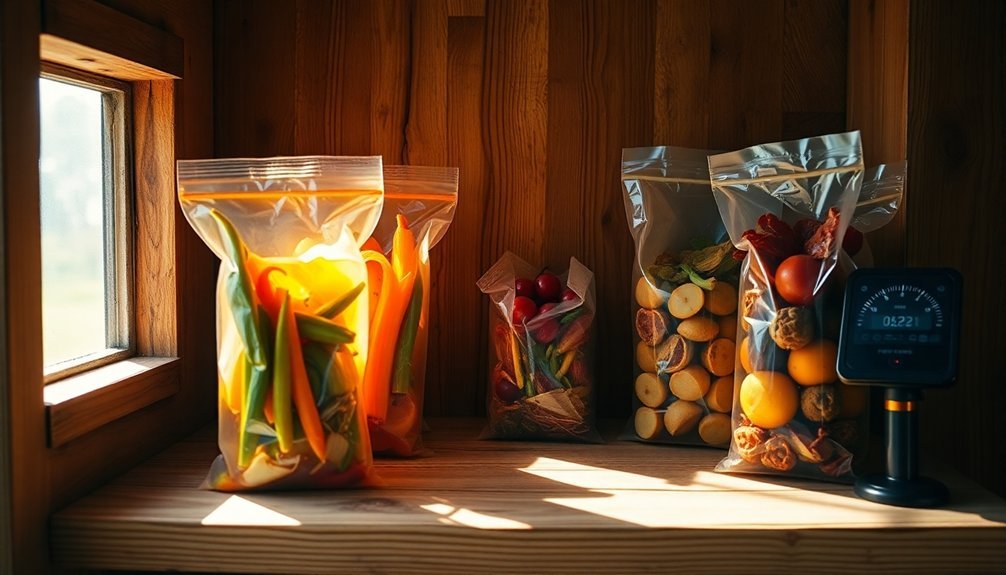
When preserving food for extended periods, you'll find multiple proven methods that go beyond basic refrigeration.
Each technique offers unique advantages for maintaining your food supply while living off the grid.
- Freeze drying stands out as the most effective long-term solution, keeping food viable for over 20 years while maintaining nutrients and flavor with minimal moisture content.
- Canning provides reliable preservation through water bath or pressure methods, making it perfect for both high-acid and low-acid foods.
- Dehydrating offers versatility and simplicity, working well for fruits, vegetables, and meats while preserving most nutritional value.
- Fermentation and pickling not only preserve food without refrigeration but also enhance flavors and boost nutritional benefits through natural processes.
These methods complement eco-friendly food storage solutions while ensuring your food stays fresh and nutritious.
Health and Sustainability Benefits
Switching to eco-friendly food bags offers a powerful combination of health and environmental advantages.
You'll protect yourself from harmful chemicals and microplastics that often leach from conventional plastic bags into your food. These sustainable alternatives, made from materials like bagasse, keep your food fresher while preventing bacterial contamination.
You're not just safeguarding your health – you're also making a significant impact on the planet.
As these bags decompose naturally, they won't contribute to landfill pollution or release harmful microplastics into waterways. They've got a lower carbon footprint during production and disposal, which means you're actively reducing greenhouse gas emissions.
Plus, you'll be supporting local economies and artisans while setting a positive example for your community, making this switch a smart choice for both your well-being and the environment.
Frequently Asked Questions
How Long Can Fermented Foods Stay Fresh in Eco-Friendly Bags?
You'll find your fermented foods stay fresh for 4-6 weeks in eco-friendly bags when stored in a cool, dark place. If you keep them refrigerated after initial fermentation, they'll last even longer.
Can These Bags Be Reused After Washing Them?
You can definitely reuse reusable snack bags after washing them. They're designed for multiple uses and machine washing. However, compostable bags aren't washable – they're meant for single use before composting.
Do Eco-Friendly Bags Work Effectively in Humid Climates?
Yes, you'll find many eco-friendly bags work well in humid climates. They're often moisture-resistant and durable, though some natural materials may degrade faster. Cellulose-based options are particularly effective in high humidity.
What Temperatures Can Eco-Friendly Food Storage Bags Withstand?
You'll find that eco-friendly food storage bags typically withstand temperatures from freezing (-18°C/0°F) up to moderate heat (70°C/158°F). They're safe for refrigeration and can handle cool pantry storage without degrading their structure.
Are These Bags Safe for Storing Raw Meat Products?
You'll need to clean eco-friendly bags thoroughly after storing raw meat. While they're safe to use, you must maintain proper hygiene and always keep raw meat separate from other foods to prevent cross-contamination.
In Summary
You'll find eco-friendly food bags are game-changers for your off-grid lifestyle. They're not just storage solutions – they're essential tools for maintaining food safety, reducing waste, and maximizing your solar cooking efforts. By choosing these sustainable options, you're protecting both your food and the environment while saving money and space. Make the switch today and transform your off-grid food preservation strategy for the better.

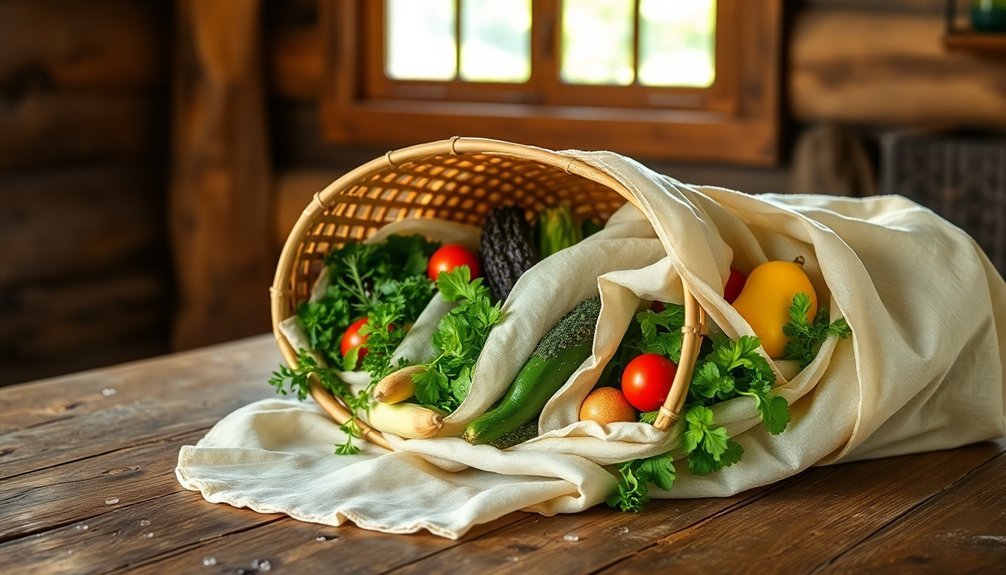
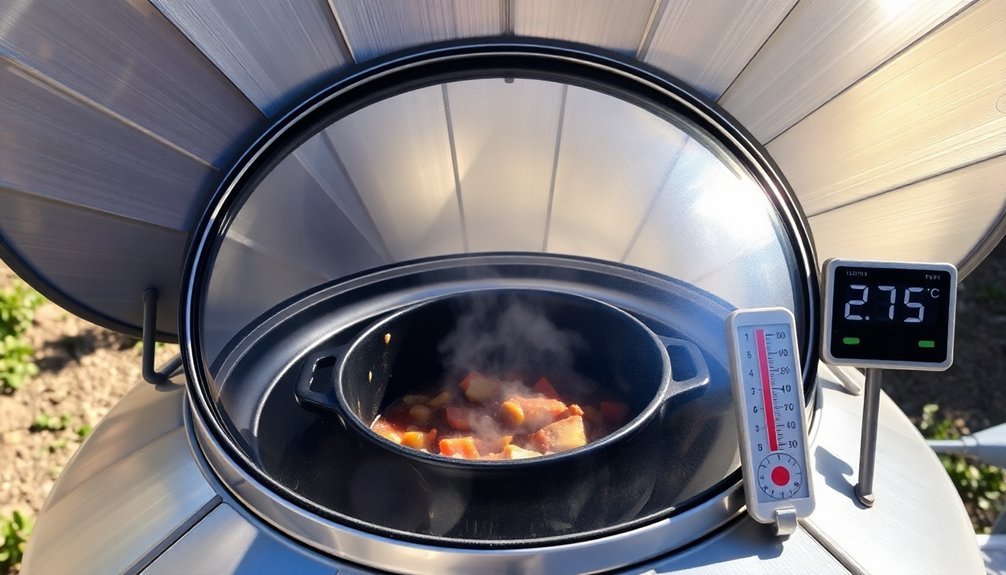
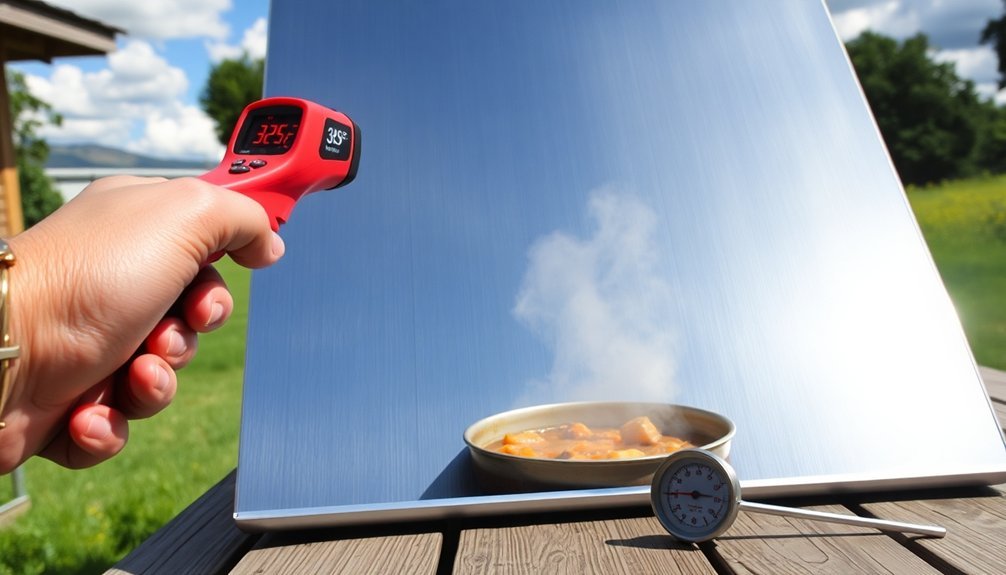
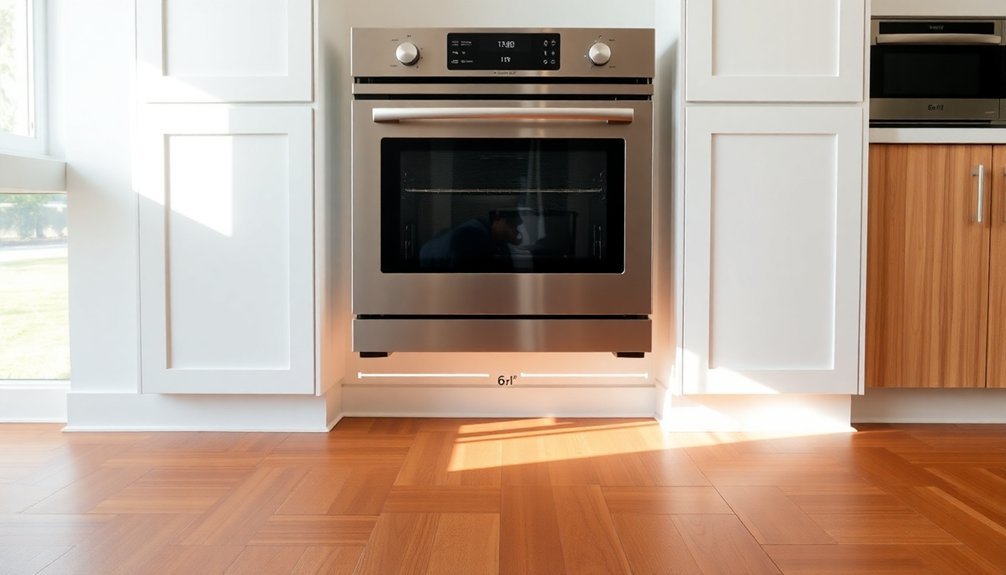
Leave a Reply